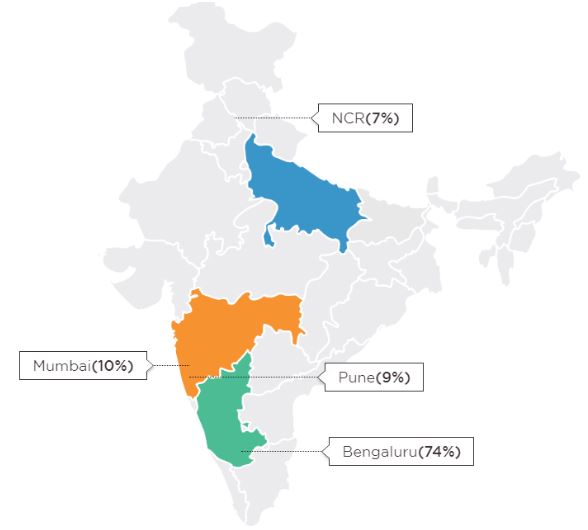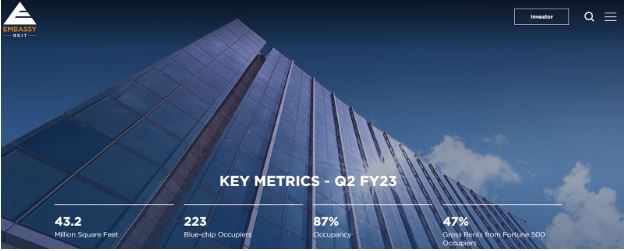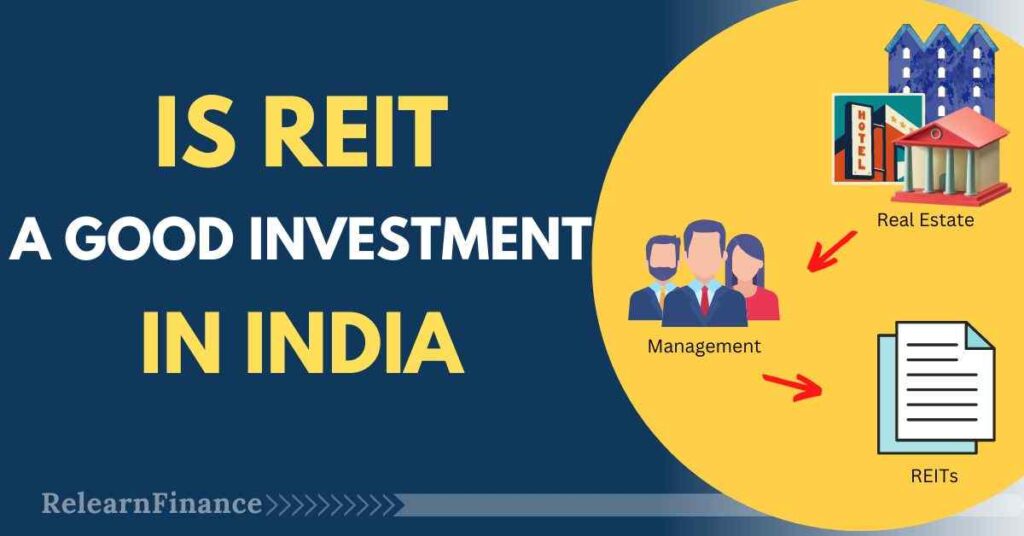Is REIT a good investment in India? Let’s discuss the benefits, and risks of REITs, the best REITs to invest in, and how to choose the right REIT.
Buying a house or commercial property for investment in real estate is a challenging affair in India.
Property prices in most metros and primary locations have already gone out of the roof.
Even though you get a good property and you make yourself ready for huge loans still the burden of paperwork, taxes, visiting government offices, putting the property on rent maintenance, etc and there is no end.
Doing all this is fine when we want the home to live but it becomes a headache for investment.
Real Estate Investment Trusts(REITs) are a popular option to solve this problem in real estate investing for retail investors.
Let’s dive in a bit and try to understand what problem REIT solves and what are the challenges of REIT investing.
Is REIT a good investment in India?
Like any other investment option, the answer cannot be simple Yes or No, because it depends on every portfolio.
Understanding the PROS/ CONS and all the decision-making factors and then deciding what’s best for your portfolio is a better approach.
Real Estate Investment Trust’s advantages
REITs can be considered suitable investments due to the following reasons
| REITs | Real Estate | |
|---|---|---|
| Diversification | REITs offer you the opportunity to diversify their portfolio and reduce the risk of investing in a single asset. By investing in a REIT, you can own a stake in a diverse portfolio of income-generating real estate assets such as office buildings, malls, and hotels. | When you invest in individual property your portfolio is concentrated into that property and there is no diversification in the type of property, region, or locality. If you live in Mumbai but the property market in Bangalore is good it’s very difficult to make use of this opportunity at the individual level. |
| Passive income | REITs generate income through rent and other income-generating activities such as the sale of real estate assets. This income is then distributed to REIT shareholders in the form of dividends. REITs offer you the opportunity to earn passive income through real estate investments. | Rental income on the property can be termed as passive but you know it is not passive in the real sense. You have to be involved with the tenant, listen and solve problems. Deal with agents for new tenants. Also, the ticket size of real estate is huge and everybody may not want to tie up so much money in a property just for 2-3% of rental yield. |
| Professional management | REITs are professionally managed by experienced real estate experts who handle all aspects of the investment including property acquisition, management, and disposal. This allows you to benefit from the expertise of professionals without the hassle of managing the properties themselves. | Managing every aspect of the property from buying to management to generating income is not easy along with a primary job/ business. There is extra time or monetary cost involved when a professional/ agent is hired. |
| Liquidity | REITs are listed on stock exchange and can be bought and sold just like stocks. This makes them highly liquid, making it easy for you to buy and sell REIT investments as needed. | Property in a highly illiquid investment. Buying/ Selling takes months to go through. Sometimes in emergencies, people do sell properties at the loss. |
| SIP Investing | You can invest in REITSs in SIP mode instead of waiting to have a huge corpus to invest in real estate. | Buying physical real estate requires huge capital at once or a long-term loan commitment. |
>> Answered: Whether To PrePay Home Loan Or Invest?
What are the disadvantages of REITs
The advantages are very attractive as it seems to save us from a lot of trouble in buying and maintaining the physical property.
However, the above benefits do come with some risks as well
| REITs | Real Estate | |
|---|---|---|
| Volatility | REITs can be more volatile than other investments, as they are subject to changes in the real estate market and the overall economy. | Physical property gives you enough time to buy or sell without much fluctuation in the value. |
| Lack of control | As a shareholder in a REIT, you don’t have direct control over the properties in the trust. You are relying on the management team to make decisions on your behalf. | Investing in physical property gives you complete control. If some changes/alterations to the property can increase its value then you can take a decision by yourself. |
| Limited diversification | Some REITs may be focused on a specific type of property or geographic region, which can limit diversification and increase risk. | If you understand the property market around you well and can make better decisions no need for diversification. |
| Management fees | REITs often charge management fees, which can eat into your returns. | Management of individual property can eat some of your time but can save management costs of REITs. |
Is REITs safe?
There are some regulations on REITs that make them safer.
#1. 80% should be invested in ready real estate
This restriction reduces the risk of investing in under-construction projects that might get delayed or halted due to any legal disputes.
#2. Regular return
REIT companies are mandated to distribute 90% of their income as a dividend to the investors at least twice a year which makes it a regular income-generating investment.
REIT investment returns
#1. 5-6% of dividend income
Rental income is distributed as dividends and you can expect 5-6% of dividend income every year.
#2. 5-6% of Capital appreciation
The value of the property appreciates over time which leads to an increase in the value of the REITs unit itself.
You can expect property value appreciation around inflation which is 5-6% in India.
So on average 10-12% of returns annually you can expect.
How to choose the best REITs?
#1. Location of properties
If you are aware of any specific location and its good future prospects then try investing in REIT with major exposure to that particular region.

#2. Occupancy of properties
Have a look at the occupancy of properties owned by the REIT, the more the occupancy better return prospects.
You can find all these details and much more on their websites.

#3. Promoters/ Clients
Promoters and management profiles can give you a good insight into the quality of the trust.

Clients are the major source of rental income for REITs. A client list with big MNCs and growing industry is a good portfolio to invest in.

Which REIT is best to invest in India?
There are 3 REITs listed on NSE and BSE in India
#1. Embassy REIT

Embassy REIT is the first listed REIT in India. It owns most of the real estate in Banglore followed by Mumbai and Pune.
Apart from corporate office parks it also owns strategic amenities like business hotels, and a 100MW solar park to supply renewable energy to clients.
#2. Mindspace REIT

Mindspace REIT has offices in Mumbai, Pune, Chennai, and Hyderabad.
It owns a quality office located in four key office markets in India and five integrated business parks with great infra and amenities like restaurants, creches, and outdoor sports arenas.
#3. Brookfield India REIT

Brokkfiled India REIT is the latest addition to the REITs in India owning commercial properties in Mumbai, Gurugram, Noida, and Kolkata.
NCR is the major contributor to this REIT. Clients include multinational IT giants like Accenture, TCS, and Cognizant.
Since there are only strong players in the REIT space right now, all 3 provide good investment options.
(This is not investment advice)
Personally, I would take exposure in all 3 as it provides good diversification into different regions and real estate types.
Tax on REIT
#1. Dividend Income
The dividend received is added to income and taxed as per tax slabs.
#2. Short-term capital gain
If REIT held is sold before 3 years a short-term capital gain tax of 15% applies the same.
#3. Long-term capital gain
If a REIT is sold after holding for more than 3 years, a long-term capital gain of 10% applies.
Conclusion
REIT is a good option when you already have exposure to physical real estate but want an alternate way to increase your investment slowly in small chunks among different regions and property types.
Another advantage of REITs is the SIP mode to make position over a long period instead of pushing huge capital at once.
REITs allow having a diversified portfolio across major cities at the click of a button with a team of professionals working to make the investment successful.
I hope this article gave you all insights on REIT investment and helped improved your knowledge.
Do comment and let me know your feedback.
FAQs
Does REIT give monthly income?
REITs distribute 90% of income as a dividend at least twice a year, this is not monthly income but you can invest it further in a way that it would look like monthly income using Systematic Withdrawal Plans.
What is the average return on a REIT?
Expect 5-6% per annum of dividend income and capital appreciation around inflation i.e 5-6% per annum which makes it a return of 10-12% on average.
What is the future of REIT?
The future of REIT in India is bright as the new age population is becoming financially aware and do not want to take huge debt and tie themselves to property.
REITs provide a great option to take small positions and benefit from the diversification and professional management of REITs.
Are REITs better than stocks?
REITs and stocks should be taken as different investment options with different goals.
Stock investment is to generate wealth with better returns than REIT.
Whereas REIT should be seen more as a diversification option.



